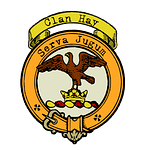Welcome back to A Clan A Day Podcast, brought to you by bagtownclans.com. I’m your host, Colin MacDonald, and today we’re turning our attention to Clan Strachan—a name rooted in the rugged lands of Kincardineshire, a region steeped in Scotland's dramatic history. The Strachans are a Lowland family with deep Highland connections, and their story spans centuries of service, loyalty, and, at times, dramatic conflict.
The name Strachan itself originates from the Gaelic "srath," meaning broad valley, and specifically refers to the lands of Strachan in what is now Aberdeenshire. It was here, nestled in the valleys north of the Highland Boundary Fault, that the early history of the clan unfolded. In the 12th century, Walderus de Stratheihen made a significant contribution to the Church of St. Andrews, laying the foundation for what would become a prominent Scottish family.
One of the earliest known members of the family, John, son of Rudolph de Strachane, gifted lands to the Abbey of Dunfermline, a gesture that was confirmed by a royal charter in 1278 under Alexander III. By the reign of David II, the barony of Strachan passed to the family of Keith through marriage, but the Strachans retained their influence, with Sir James Strachan of Monboddo later securing lands in Thornton.
It was Sir Alexander Strachan of Thornton who would elevate the family’s standing even further. In 1625, King Charles I created Sir Alexander a Baronet of Nova Scotia, a prestigious title that underscored the family’s growing influence. The baronetcy would eventually pass into the senior line of Monboddo by a royal charter in 1663, further cementing the Strachans' noble status.
The Strachans were not just landowners—they were warriors and leaders, playing critical roles in some of the most pivotal moments in British history. During the Napoleonic Wars, Admiral Sir Richard Strachan, the 6th baronet, gained renown for his leadership. On November 2, 1805, he commanded a squadron that captured four French battleships, a feat achieved with minimal British casualties. This victory, which followed Lord Nelson’s triumph at Trafalgar, earned Sir Richard a Knighthood of the Bath and the Freedom of the City of London.
Despite their many achievements, Clan Strachan's fortunes waned in the 19th century, and by 1854, the baronetcy became dormant. The clan, like many others, faced challenges in maintaining their prominence as the social and political landscape of Scotland evolved. However, the legacy of the Strachans has endured through efforts to revive and preserve the clan’s heritage.
In recent years, Clan Strachan has experienced a resurgence. In 2014, a pivotal moment in the clan’s modern history occurred when a Family Convention, known as an Ad Hoc Derbhfine, was held under the supervision of the Court of the Lord Lyon. This meeting, held in Edinburgh, resulted in the unanimous recognition of Rob Strachan of Mill of Strachan as the clan's commander, a significant step toward re-establishing a recognized chief for the clan. The Lord Lyon officially extended Rob Strachan’s commandership for another five years in 2019, bringing the clan closer to formal recognition of a hereditary chief.
The geographical location of the village of Strachan, near the Highland Boundary Fault, has sparked debate over whether the Strachans should be classified as a Highland or Lowland clan. Technically, the lands of Strachan lie in the Highlands, but historically, the family’s roots and influence have been in the Lowlands, much like other notable Scottish families such as the Gordons and Frasers. During the medieval period, the Strachans were best understood as a Lowland family residing within the Highland region, a testament to their unique position in Scotland's complex social fabric.
The Strachans' history is also intricately tied to some of Scotland’s most significant events. During the Wars of Scottish Independence, the Strachans were likely allied with the Comyn family, blood relations through marriage, which placed them at odds with Robert the Bruce. Following Bruce’s victory at the Battle of Bannockburn in 1314, the Strachans, like many families loyal to the Comyns, were disinherited. Their lands were granted to Sir Alexander Fraser, but by the mid-14th century, the Strachans had regained prominence through strategic marriages and royal favors.
One of the most intriguing aspects of Clan Strachan’s story is their connection to some of Scotland's most dramatic historical figures. The family’s early ties to Máel Petair, the Mormaer of Mearns, who played a role in the murder of King Duncan II, and their likely descent from Anglo-Norman nobility, add layers of complexity to their legacy. Through centuries of alliances and conflicts, the Strachans have remained a family deeply intertwined with Scotland's broader historical narrative.
Today, the Clan Strachan Society works to preserve and promote the history of this storied family. The society was granted a new coat of arms in 2012 by the Lord Lyon, recognizing the clan’s Armigerous status and its efforts to uphold the traditions and heritage of Clan Strachan.
From their origins in the broad valleys of Aberdeenshire to their role in shaping Scottish and British history, the Strachans have left an indelible mark. As we look to the future, it is likely that Clan Strachan will soon have a recognized chief, restoring a sense of unity and continuity to this proud and ancient family.
Thank you for joining us today on A Clan A Day Podcast. I’m Colin MacDonald, and I hope you’ve enjoyed this deep dive into the history of Clan Strachan. Be sure to tune in tomorrow for another exciting episode. Until then, slàinte mhath!











